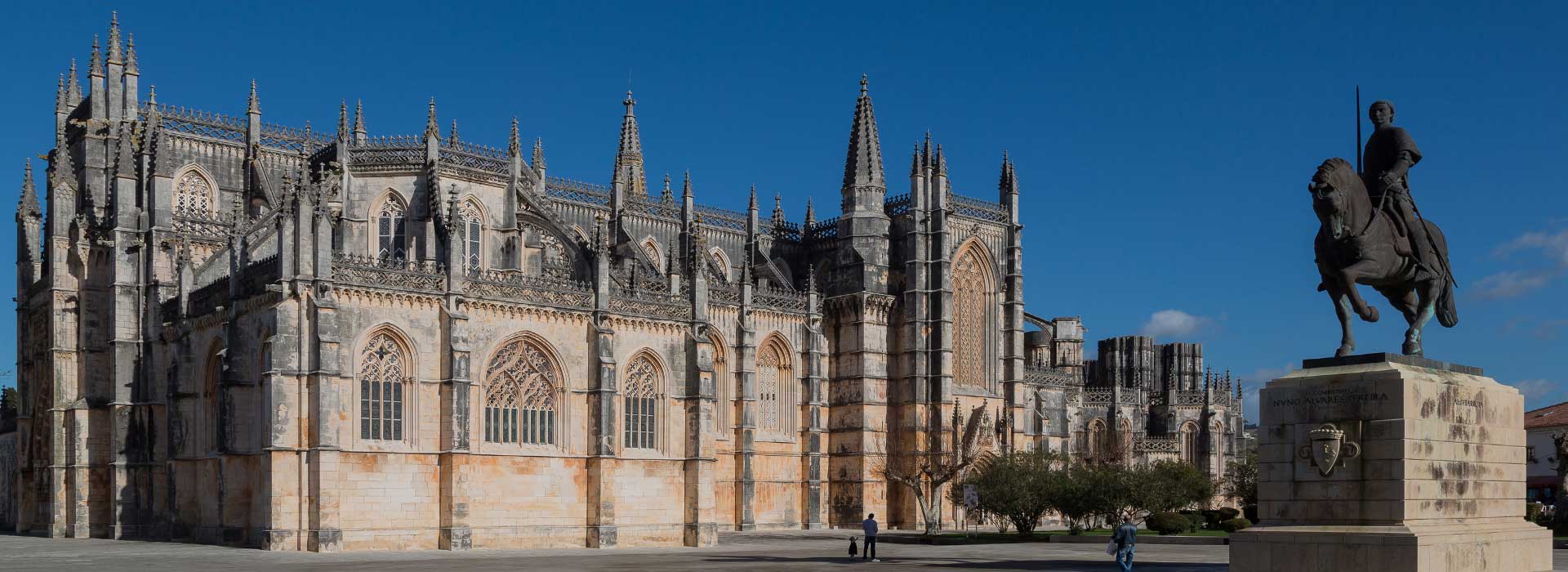
Situated 11 kilometres (17 mi) south of Leiria and 140 kilometers (86 mi) north of Sintra, Batalha boasts the renowned Batalha Monastery, also known as the Mosteiro de Santa Maria da Vitória. This Gothic marvel ranks among Europe's premier attractions and draws visitors from Lisbon and Sintra alike. Welcome to MADABOUTSINTRA.COM, your ultimate guide to enhancing your Batalha experience. We offer indispensable insights into nearby attractions, along with expert advice on accommodation and dining choices. Rest assured, you can book hotels confidently with our free cancellation options. Additionally, our travel tips and curated tours ensure a seamless and enjoyable visit.
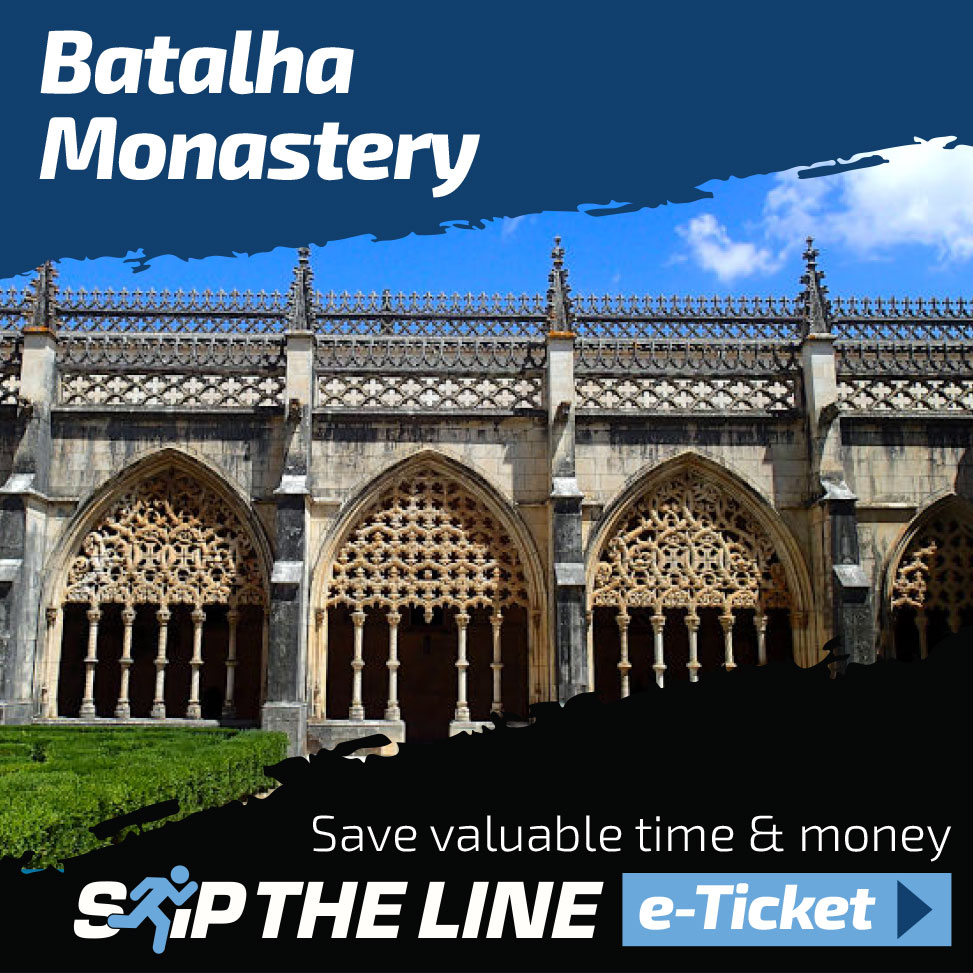
With this entrance ticket you can gain entry to the Batalha Monastery (Mosteiro de Santa Maria da Vitória) at your leisure. Buy online before you arrive to avoid queues and have the convenience of the e-ticket on your phone…
Book with confidence with the FREE CANCELLATION option.
• Kids under Twelve get in free, no ticket required
• If your plans change we have you covered with the option to cancel and get a full refund
October to March, Daily: 09h00 - 18h00
(last admission at 17h30)
April to October, Daily: 09h00 - 18h30
(last admission at 18h00)
Adult: €6.00, Combined Ticket:
Alcobaça, Batalha, Convento de Cristo: €15.00, Concessionary: €3.00, Child under 12: FREE, First Sunday of each month: FREE.
![]() Lisbon Card: FREE
Lisbon Card: FREE
CONTACT DETAILS
Largo Infante Dom Henrique, 2440 Batalha, Portugal.
39° 39' 34.7"N | 08° 49' 30.5"W
+351 244 765 497
bilhetesgrupo@dgpc.pt | Website

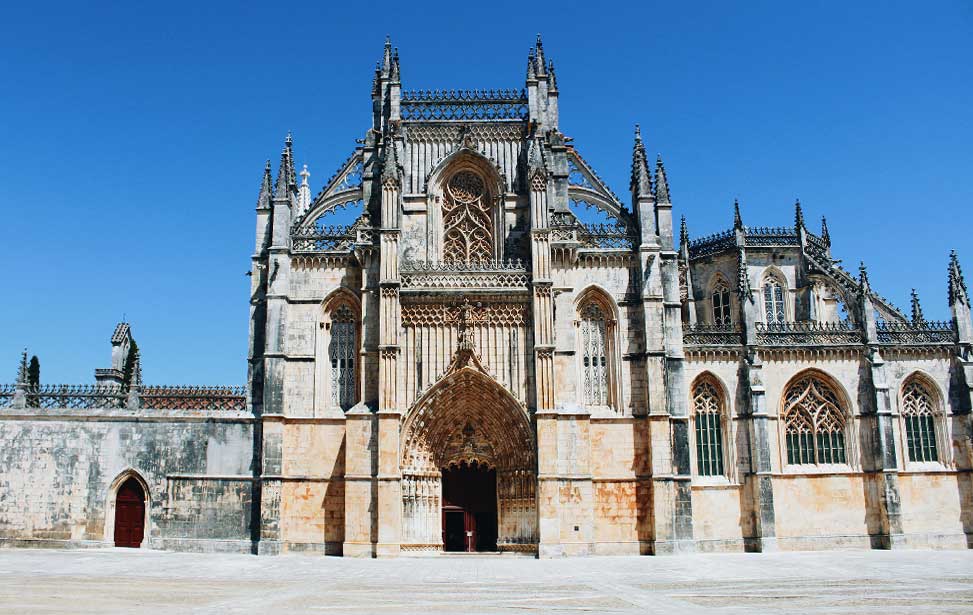
Batalha Main Façade
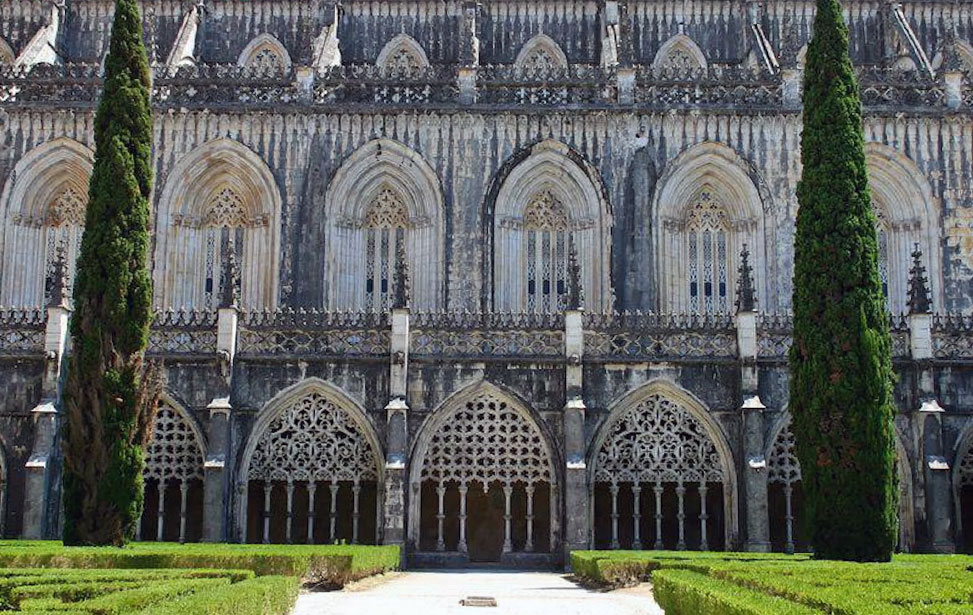
Royal Cloister (Claustro Real)
Did you know that "Batalha" translates to "Battle" in Portuguese? This name traces back to the historic Battle of Aljubarrota in 1385, a pivotal event in Portuguese history. Before the battle, Dom João I pledged to the Virgin Mary, promising to erect a grand cathedral if victorious.
The conflict arose after the death of King Ferdinand I of Portugal in 1383, sparking a succession dispute. Castile became involved, leading to civil unrest. In 1386, English longbow archers played a crucial role in the Portuguese victory, solidifying the enduring bond between Portugal and England through the Treaty of Windsor. Dom João I sealed this alliance by marrying Philippa, daughter of John of Gaunt.
The Monastery's construction began in 1386, spanning over a century and reflecting various architectural styles, including Rayonnant Gothic and Manueline. Fifteen architects contributed to its design, with Afonso Domingues crafting the initial plans. Huguet, who succeeded Domingues, added flamboyant late Gothic elements, visible in the main façade and chapter house domed roof. Fernão de Évora and Mateus Fernandes the Elder continued the embellishments, culminating in the Manueline flourishes around portals and windows.
The construction concluded in the mid-16th century, transitioning into the burial site for the Aviz dynasty. Despite surviving the 1755 earthquake, the monastery faced devastation during the Napoleonic invasion in 1810. Following the dissolution of monasteries in 1834, neglect befell the complex until King Ferdinand II initiated its restoration, a process spanning six decades.
Designated a national monument in 1907 and added to UNESCO's World Heritage list in 1983, Batalha Abbey stands as a testament to Portugal's rich history and architectural prowess.

The abbey boasts an array of decorative elements, including intricate fleur-de-lis patterns etched into the balustrades, ornate crockets adorning the pinnacles, and masterful craftsmanship accentuating the portals and windows. Vertical features like pilasters and Gothic arched windows imbue the structure with a sense of soaring towards the heavens.
Enter through the west façade and take a moment to appreciate the elaborate carvings embellishing the portal. Flanking the entrance are sculptures depicting the twelve apostles, each with distinctive characteristics. Upon passing through the archway, you'll encounter medieval sculptures of biblical figures playing musical instruments. At the apex of the arch, a striking high-relief statue of Christ in Majesty is accompanied by the Evangelists.

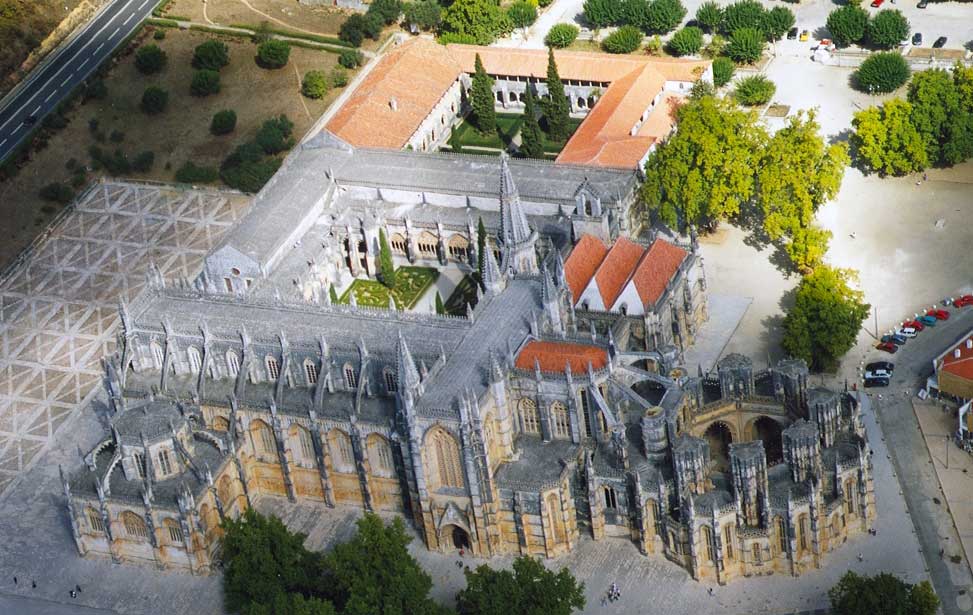
Batalha Aerial View
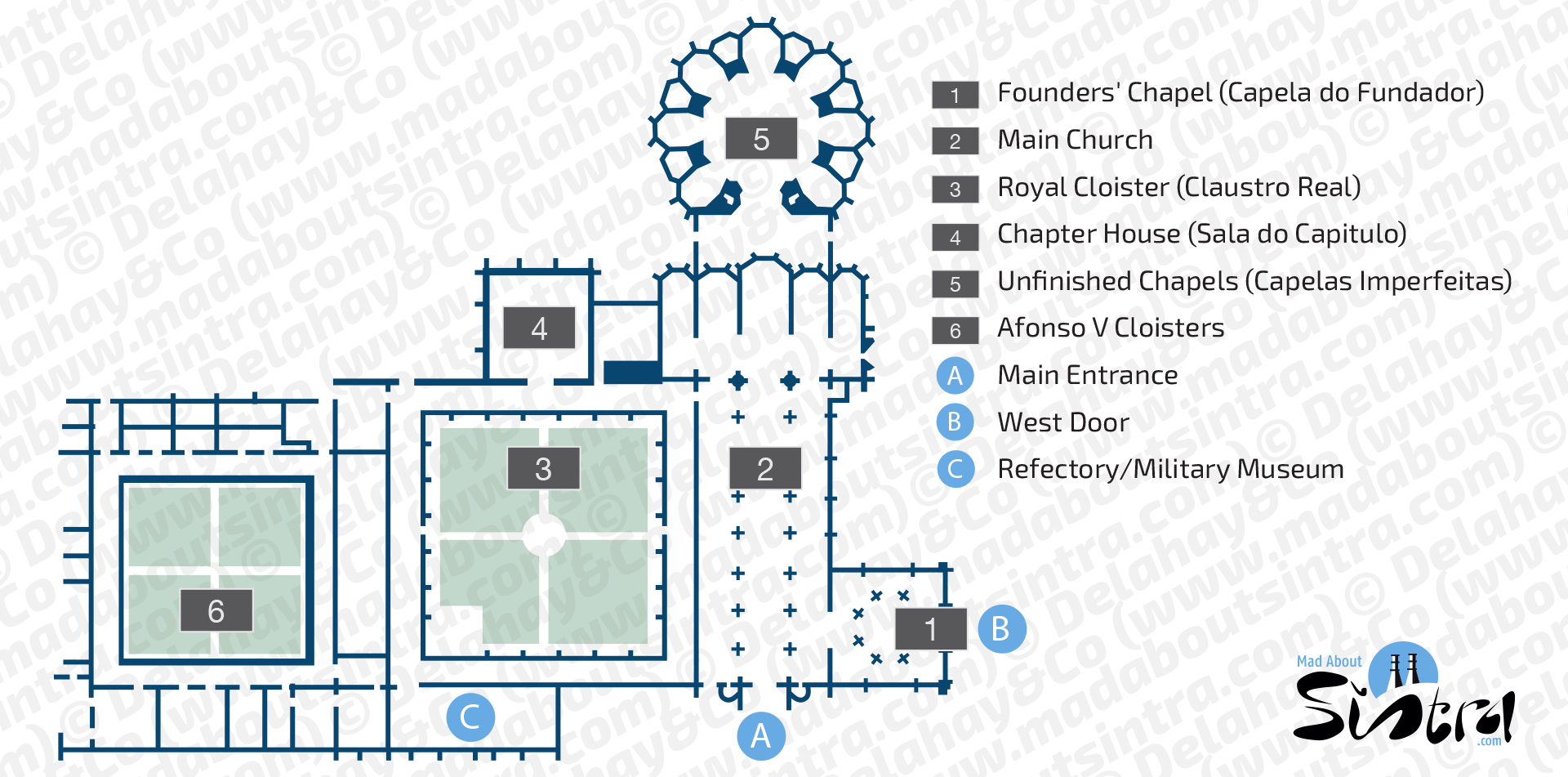
Batalha Plan
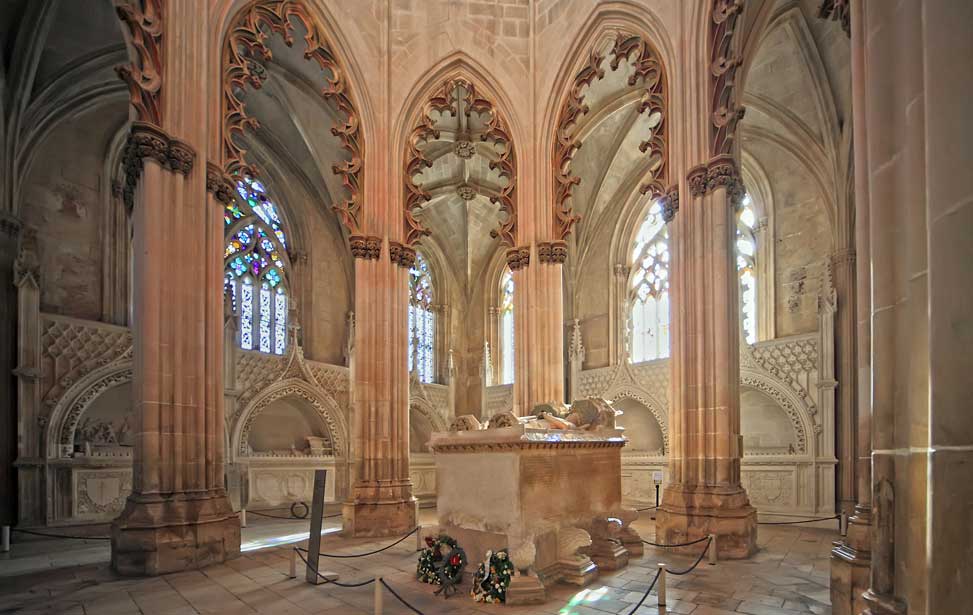
1
Upon entering the church, a right turn leads you to the Capela do Fundador, also known as the Founder’s Chapel. This chamber showcases the prominent English Perpendicular style, likely crafted by the English architect Master Huguet. The chapel's layout features an octagonal space supported by eight piers within a square, serving as the initial royal pantheon. The ceiling boasts an intricate eight-point star-shaped lantern positioned above the grand joint tomb of King João I of Portugal (d.1433) and his wife Philippa of Lancaster (d.1415).
Notably, their effigies are depicted holding hands, symbolising the enduring love and the strong alliance between Portugal and England. Along the southern walls of the ambulatory, recessed arches house the tombs of João and Philippa's youngest sons and their respective spouses.
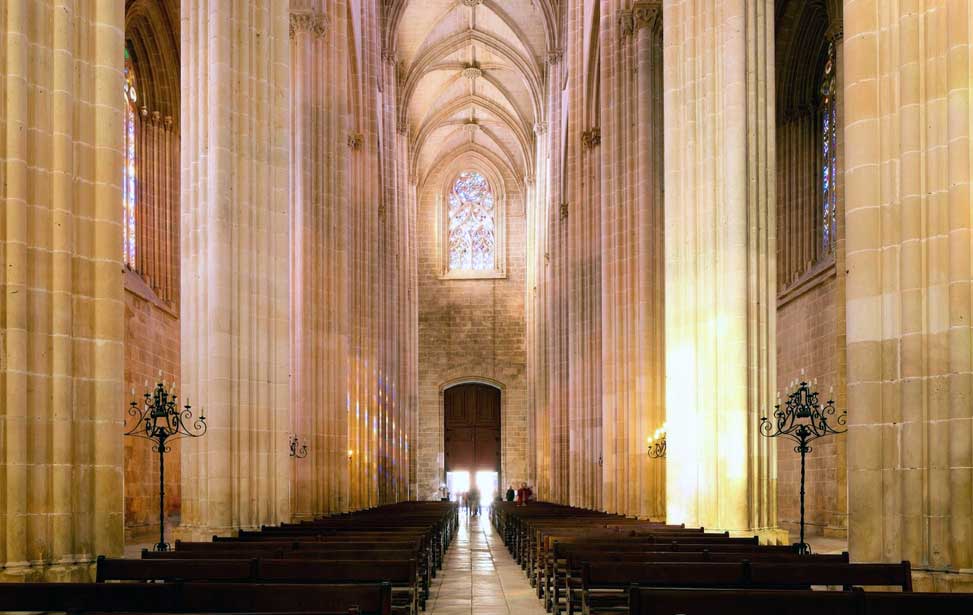
2
When Huguet took over the construction of Batalha from Afonso Domingues, he elevated the nave to its current height of 32.4 metres, creating an impressive architectural feat. Following the Gothic architectural style, the central nave, which happens to be the longest in Portugal, is characterised by its narrowness and rib-vaulted ceiling, supported by compound piers. The infusion of natural light is facilitated by ten stained-glass windows, potentially among the earliest in Portugal, with some dating back to the 1430s.
The side naves, narrower and lower than the central nave, guide visitors to the transept located at the heart of the crossing. Here, a modern high altar stands before the proper chancel. Comprising five polygonal chapels, the chancel's central chapel stands out with its heightened and deeper structure compared to the four side chapels.
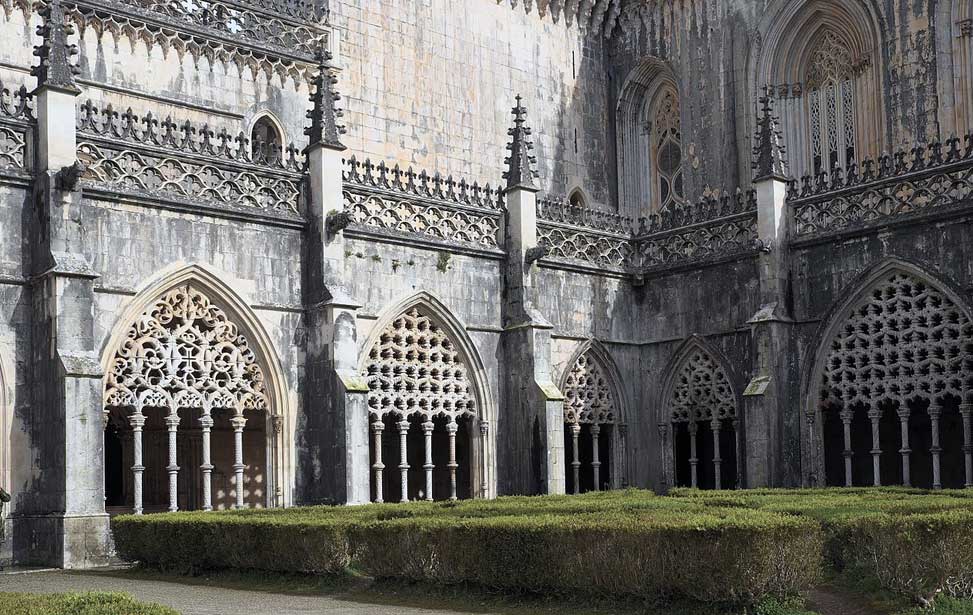
3
The Royal Cloisters, dating back to the late 1380s, epitomise exquisite Gothic architecture. Over a century later, Manueline adornments were integrated, reflecting Portugal's cultural enthusiasm during the Age of Discovery. These Manueline elements, showcasing motifs inspired by exotic flora and maritime symbols, adorn each arch, demonstrating the nation's diverse artistic expression. Intricate arcade screens, supported by spiral colonnettes embellished with symbols representing D. Manuel I, the Order of Christ's Cross, and the armillary sphere, further enhance the cloisters' allure.
A notable highlight deserving of careful examination is the Lavabo (Lavatório), situated in the northwestern corner of the Claustro Real. Crafted by Mateus Fernandes, this triple-bowl fountain stands as a testament to artistic ingenuity and craftsmanship.
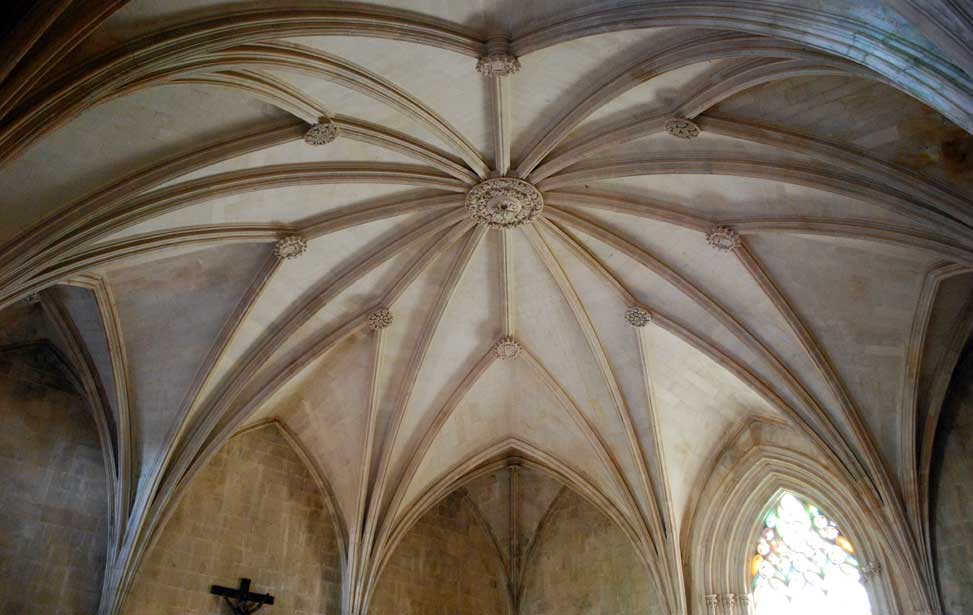
4
The Chapterhouse (Sala do Capitulo), an impressive extension of the Royal Cloisters, showcases remarkable architectural feats. Its star-vaulted ceiling, spanning an expansive 18 square metres and soaring 20 metres (60 ft) without central supports, was considered groundbreaking during its construction. Afonso Domingues, the visionary designer, went to extraordinary lengths to ensure its integrity, including spending a night in the Chapterhouse after the removal of scaffolding.
Adorning one wall is a stunning stained glass window from 1508, depicting scenes from the Passion, adding to the room's grandeur and historical significance.
Within this vast chamber lie the tombs of two Unknown Warriors, commemorating those who sacrificed their lives in conflicts abroad. One warrior fell in France during the Great War, while the other perished in Portugal's colonial wars in Africa. Visitors can explore further details about these brave individuals at the military museum housed in the refectory, located on the opposite side of the cloister.
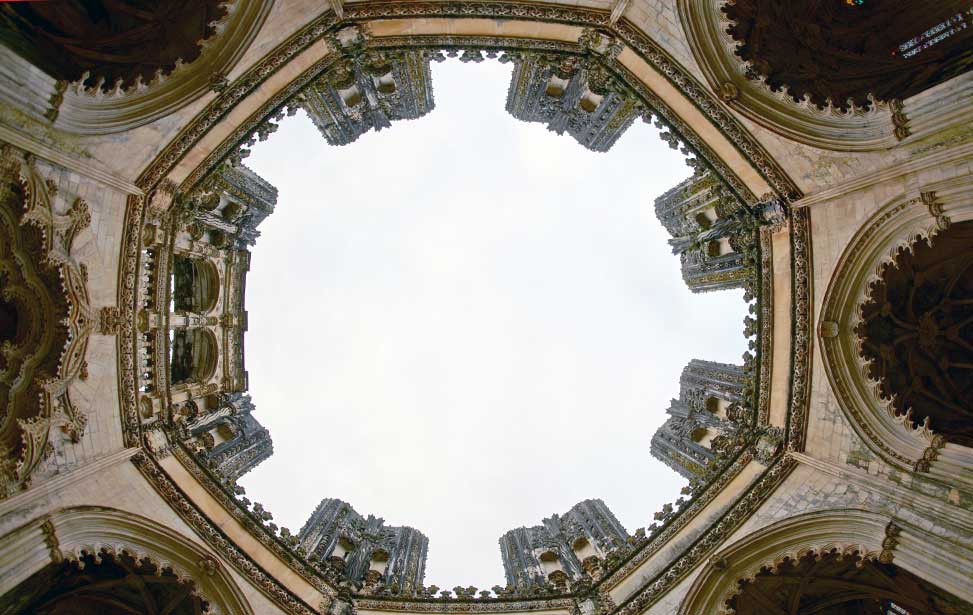
5
Adjacent to the church's choir, accessible only from outside the main complex, lies the octagonal structure known as the Unfinished Chapels or Capelas Imperfeitas. Commissioned in 1437 by Dom Duarte, the eldest son of João and Philippa, as a royal mausoleum, only he and his wife, Eleanor of Aragon, found their final resting place here. While Huguet laid the initial foundations, subsequent architects, most notably Mateus Fernandes, left an indelible mark on the structure.
Fernandes, a master of the Manueline style, transformed the space with remarkable alterations. His main portal, soaring fifteen meters high, is a masterpiece of intricate carvings, featuring floral motifs, linked chains, clover-shaped arches, and curious depictions of vegetables and stone snails. The upper floor, designed by Diogo de Boitaca, is equally awe-inspiring, with elaborately adorned buttresses originally intended to support a vaulted ceiling. Construction, however, ceased abruptly in 1533.
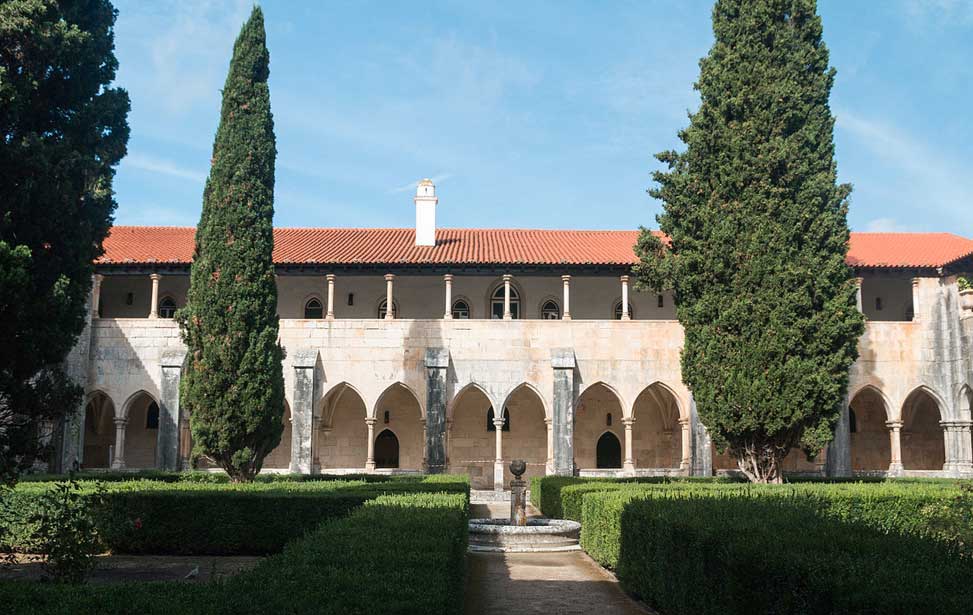
6
In contrast to the lavish design of the Royal Cloister (Claustro Real), the Afonso V Cloister maintains a more austere appearance. Unlike its counterpart, it remained untouched by additional adornments, preserving its original Gothic character. Master builder Fernão de Évora constructed it in the latter part of the 15th century, pioneering the construction of cloisters on two levels in Portugal. Notably, the keystones in the vault feature the coat of arms of Dom Duarte I and Afonso V.
October to March, Daily: 09h00 - 18h00
April to October, Daily: 09h00 - 18h30
Adult: €6.00, Combined Ticket:
Alcobaça, Batalha, Convento de Cristo: €15.00, Concessionary: €3.00, Child under 12: FREE, First Sunday of each month: FREE.
![]() Lisbon Card: FREE
Lisbon Card: FREE
Largo Infante Dom Henrique, 2440 Batalha, Portugal. | 39° 39' 34.7"N | 08° 49' 30.5"W
+351 244 765 497
bilhetesgrupo@dgpc.pt | Website
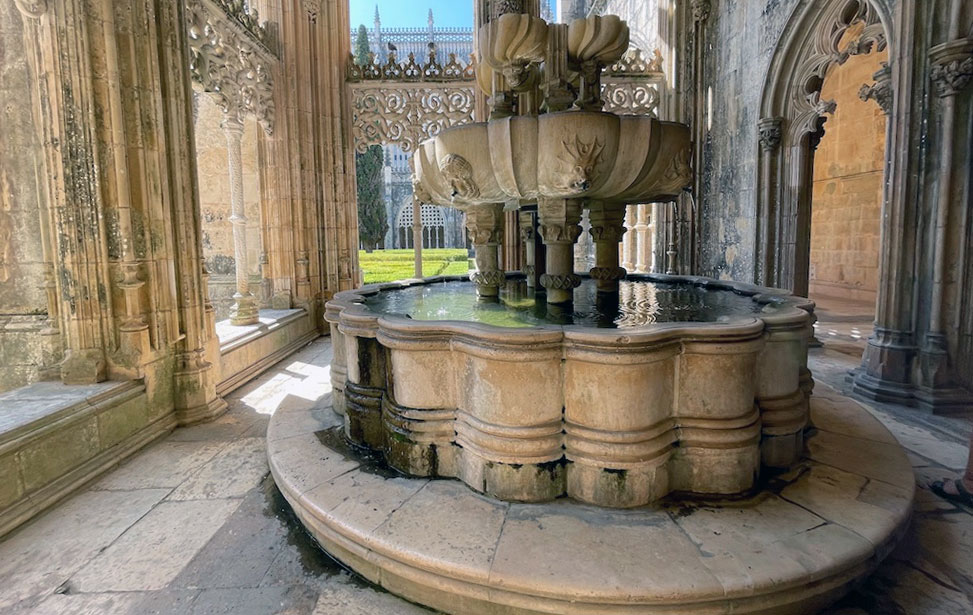
Fountain (Lavabo)
|
There are plenty of various types of eateries in close proximity of the Abbey. | |
|
There are toilets in the abbey in various places. | |
|
There is free car parking both to the North and South of the monastery. Buses should park to the South of the monument (private parking) or East (next to the multi-use pavilion). | |
|
The building is fully accessible for those with reduced mobility and wheelchairs and an escort is available, if required. |
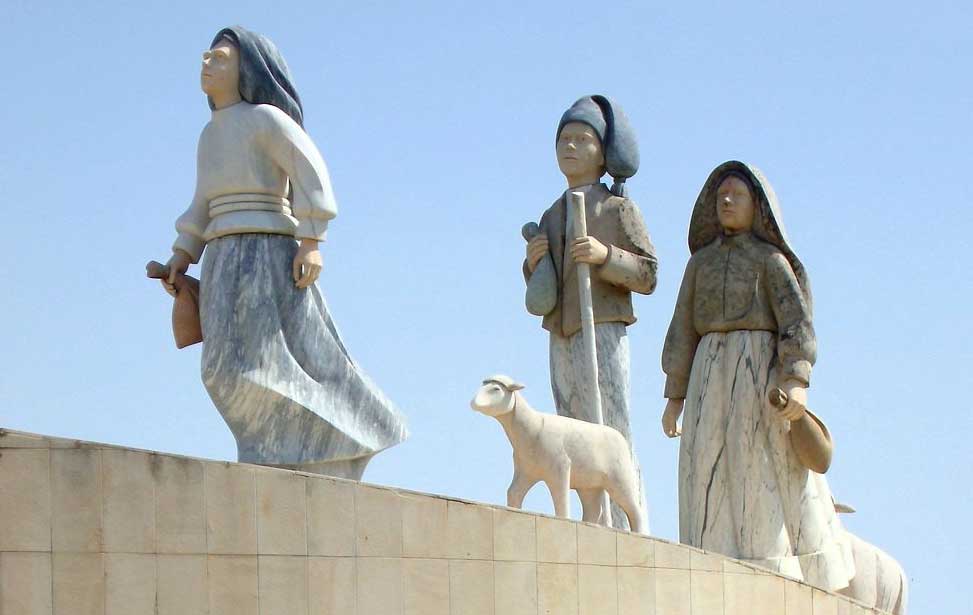
Explore Portugal’s rich cultural and religious history on this full-day tour from Lisbon. Visit Fátima, one of the world's largest pilgrimage sites and its huge modern church, Batalha and Nazaré. Explore the historic village of Óbidos.
Pick-up will be at your hotel or accommodation in Lisbon. If your hotel is in the Alfama, Bairro Alto, or Baixa de Lisboa areas or your hotel is difficult to access by car, then an alternative pick-up location will be arranged.
(794) | 11 Hr | ✔ Free Cancellation
Check Availability
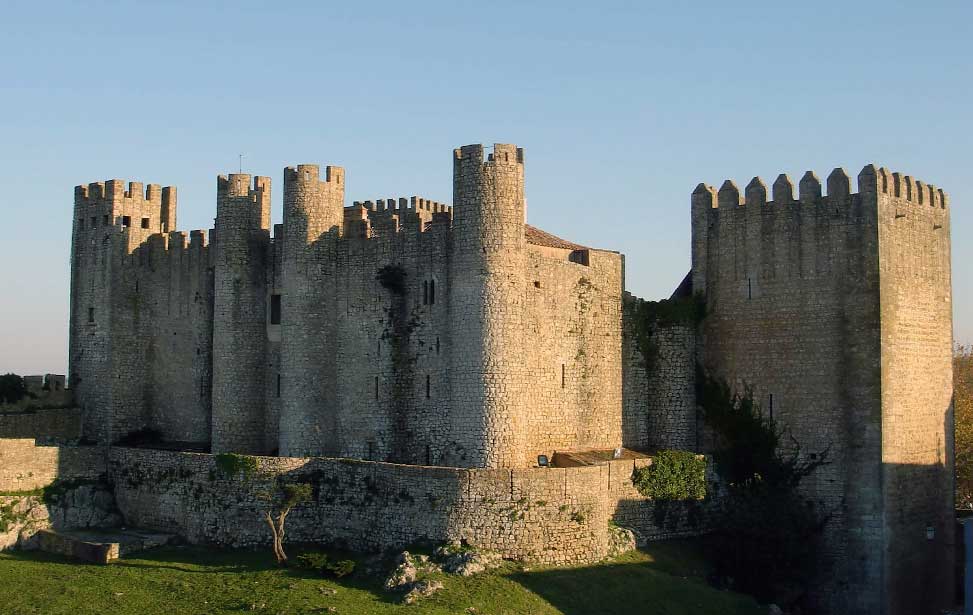
Escape the metropolitan bustle of Lisbon in favour of the rural tranquillity of four nearby cities on a private full-day tour to Fátima, Batalha, Nazaré, and Óbidos.
Absorb the sacred ambience of the Monastery of Batalha; admire the coastal charm of Nazaré's beaches; and hear of the mysterious apparitions said to have occurred at Fatima. Gain a fascinating perspective of the region surrounding Lisbon from your expert guide on this enriching tour.
(179) | 8 Hr | ✔ Free Cancellation
Check Availability
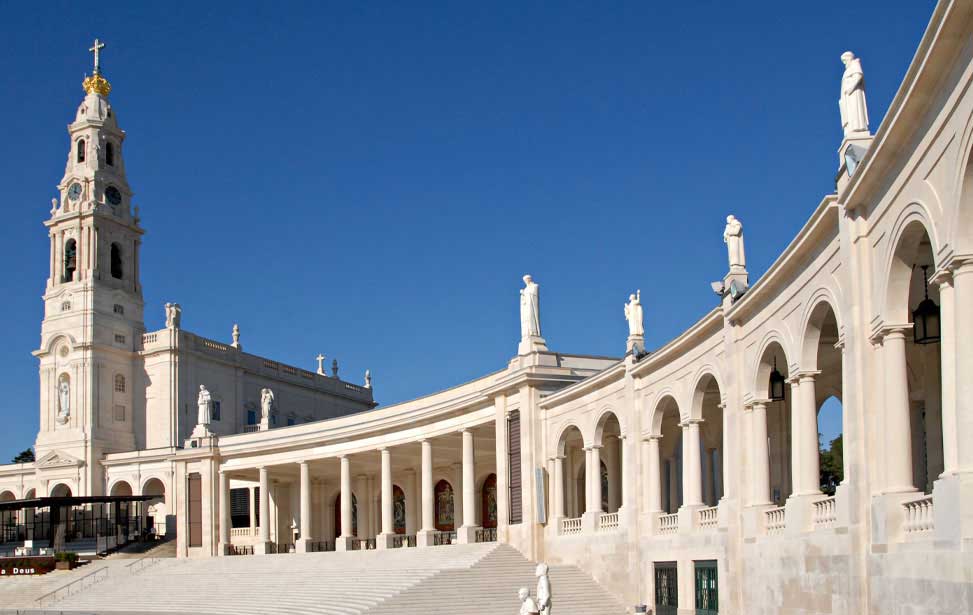
Join us on a captivating journey to the Sanctuary of Our Lady of Fátima, a major pilgrimage site that draws millions annually. Next, explore Batalha’s stunning 14th-century monastery before visiting Nazaré, a famous fishing village known for its giant waves. Tugabuddies, a top sightseeing tour agency since 2016, specialises in personalised tours across Central and Western Portugal. With passion, experience, and local knowledge, we craft unforgettable tours that exceed expectations. We're not just guides; we're your Portuguese best friend!
Check Availability
Discover Batalha, a charming town renowned for its internationally acclaimed Dominican abbey. While many tourists arrive on guided tours focused solely on the abbey, savvy travellers know that Batalha offers much more. Nestled in the Lena Valley within the Leira district, north of Lisbon, Batalha serves as an ideal base for exploring nearby attractions like Alcobaça, Fátima, Leiria, Óbidos, Peniche, and Nazaré, all within easy day-trip distance. After the tour buses depart, you can enjoy the quaint cafes and restaurants surrounding the abbey, offering personalised service and a chance to immerse yourself in the local atmosphere.
The Ponte da Boutaca, a historic bridge spanning the Calvaria River, stands as a testament to Batalha's rich heritage. Originally constructed by Diogo Boytac, a French artist involved in building both the Batalha Monastery and the Jerónimos Monastery in Belém, the bridge features six Gothic arches. Built in the late 19th century, it showcases Revivalist and neo-Gothic architectural styles. Remarkably, it remains the only bridge in the country with intact toll road houses, now housing collections of local arts and crafts. Classified as a building of public interest in 1982, it is also included in the special protection zone of the Monastery of Batalha.
Despite being overshadowed by the grandeur of the abbey, the Igreja Matriz da Exaltação de Santa Cruz church is a hidden gem worth exploring. Its standout feature is the intricate Gothic-Manueline portal, constructed in 1540 to serve the abbey's construction team. While the interior boasts a more austere ambiance, the altar, crafted from local marble, adds a touch of elegance to this historic church.
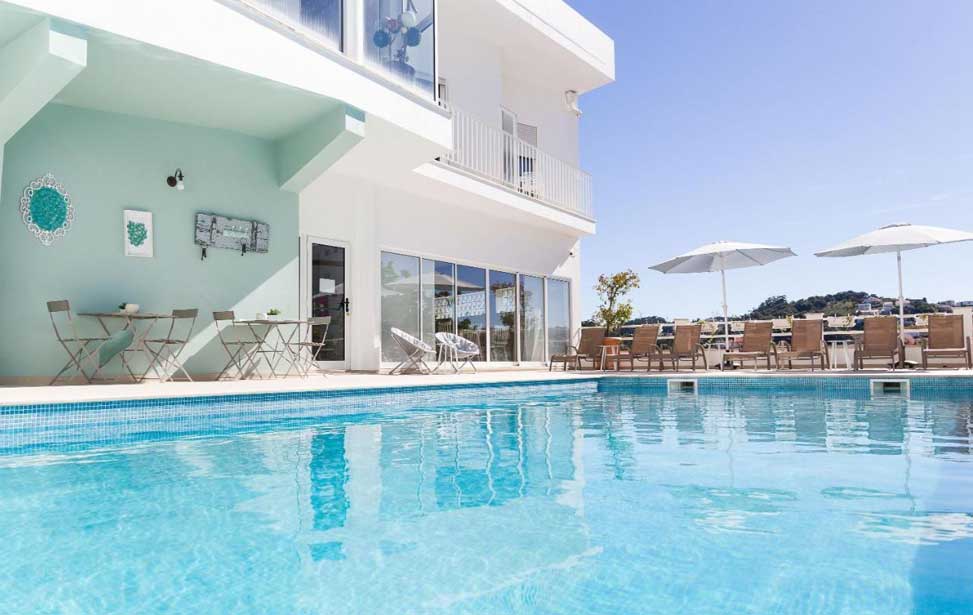
9.2/10 Superb (724 verified customer reviews)
Located in Batalha, Casa do Outeiro - Arts & Crafts Boutique Hotel offers scenic views of the Monastery. Most rooms feature a private balcony, some with a view over the monastery. Facilities include an indoor heated pool and the property was renovated in early 2017. The air-conditioned rooms at Casa Do Outeiro feature unique décor, with several decorative pieces created by the property's owners. All rooms have a flat-screen cable TV, a refrigerator, and tea and coffee making facilities.
The Hotel offers free WiFi access throughout. The hotel also has a games room with a billiards table and a children’s playground. Every morning, guests can enjoy a buffet breakfast in the hotel’s breakfast room. The hotel also has an honesty bar with drinks, snacks and a fireplace.
Largo Carvalho do Outeiro, 4, 2440-128 Batalha, Portugal. | 39° 39' 25.0" N | 08° 49' 25.3" W
Check Availability
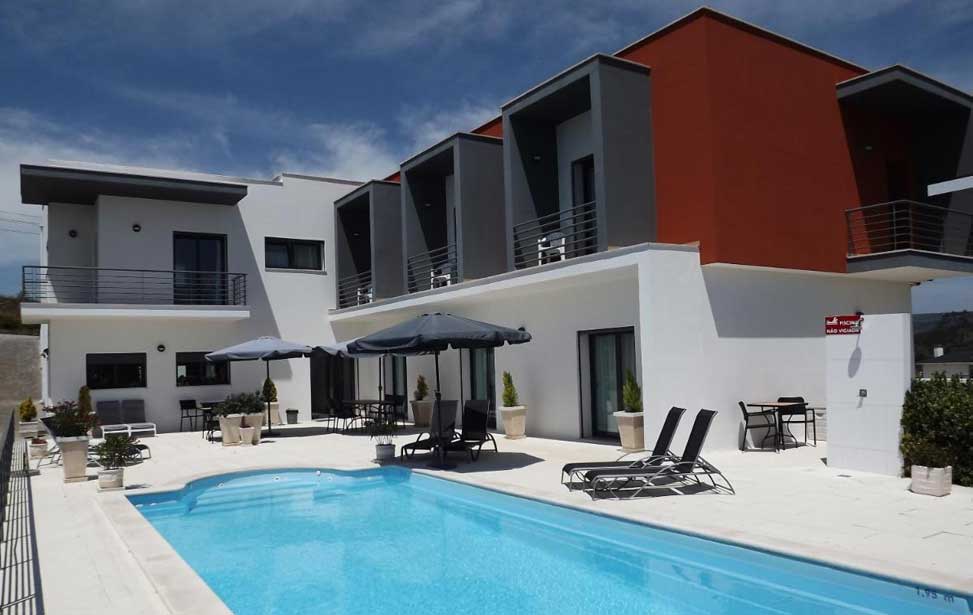
9.1/10 Superb (89 verified customer reviews)
Casa Ceedina offers contemporary accommodation a couple of kilometres from Batalha. It features a pool with sun loungers and a spa with massage treatments available. Decorated with designer furniture, rooms at Casa Ceedina Bed And Breakfast & Beauty open out onto private balconies with views. They all offer a private entrance and an intimate seating area with a flat-screen TV. Guests will enjoy the daily breakfast prepared with local specialities and served in the dining hall or outdoor on the panoramic terrace. Barbecue facilities are also available. Wi-Fi access is free at Casa Ceedina and complimentary parking is available.
3 Rua Do Malta, 2440-025 Batalha, Portugal. | 39° 39' 27.4" N | 08° 48' 17.8" W | +351 914 114 730
Check Availability
As its title suggests this restaurant specialises in Leitão (suckling piglet) which is cooked in their house style to perfection. If you're not a porky type of person don't be put off because there are plenty of other options on the menu to choose from, all of which are of equal quality and tastiness. Popular with locals the staff are as attentive as possible and at hand for recommendations and wine pairings.
Daily: 12h00 - 15h00/19h00 - 23h00
38 Casal da Amieira, Batalha 2440-477, Portugal. |
39º 38' 55.4" N | 08º 50' 23.0" W
+351 244 767 853 | mosteirodoleitao@gmail.com | Website |
Facebook
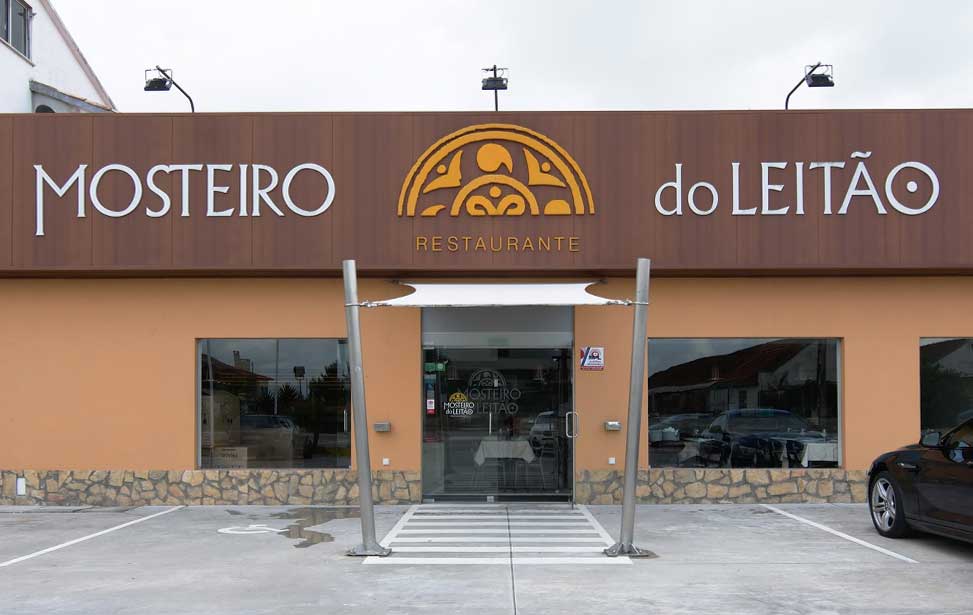
A traditional and unpretentious restaurant that is respected for the quality of its produce and the quality of service provided. Set overlooking the Monastery of Batalha, the Burro Velho Restaurant offers a relaxed atmosphere of comfort and good taste, an ideal setting to enjoy the best of traditional food, prepared with creativity and with ingredients carefully selected and cultivated, (often by organic farming).
Although the Burro Velho (old donkey) isn't himself on the menu there are plenty of tempting dishes of fish, meat and seafood. Be sure to try their Octopus Rice, several recipes of Cod Fish, and, of course, the famous house style steak.
Daily: 12h00 - 15h00/19h00 - 23h00
Rua Nossa Sra. do Caminho nº6A, 2440-121 Batalha, Portugal. |
39º 39' 33.8" N | 08º 49' 28.3" W
+351 244 764 174 | geral@burrovelho.com | Website
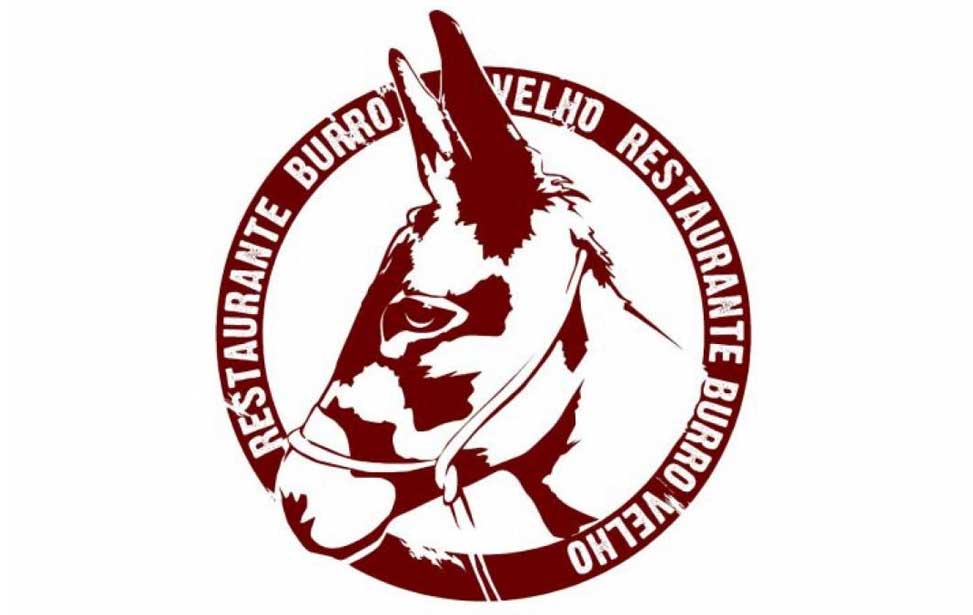
| Batalha is 114km (71mi) North of Lisbon Portela Airport Website GET A GREAT DEAL ON FLIGHTS:
|
|
| Get on the A16 in Algueirão-Mem Martins from N249 and Av. Mário Firmino Miguel, drive from A8 to Alpedriz. Take the exit 23 from A8. Continue on N242-4 to Batalha. Latitude - 39º 38' 55.4" | Longitude - 08º 50' 23.0" GET A GREAT DEAL ON CAR HIRE:
|
|
|
Take the urban train service (comboios urbanos) to Lisbon's central train station Rossio. |
|
| Rede Expressos run services to Batalha from Lisbon Sete Rios coach startion and takes about two hours.
Website |